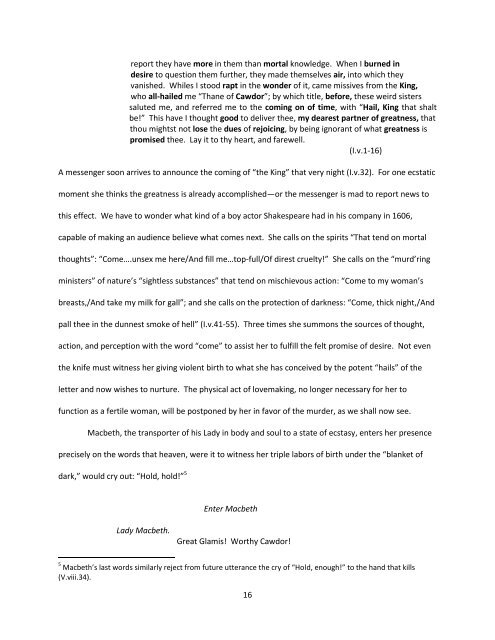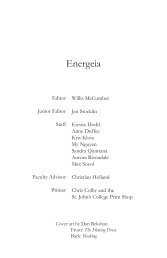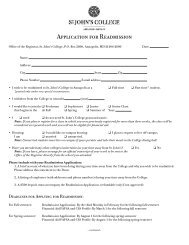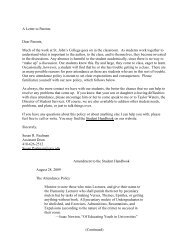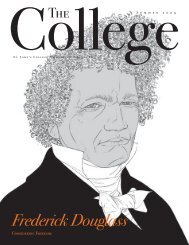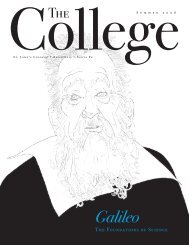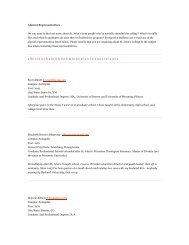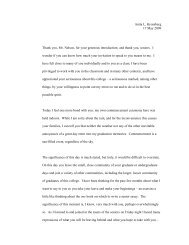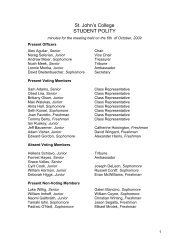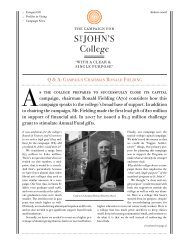âTo Meet with Macbeth,â given by tutor Louis ... - St. John's College
âTo Meet with Macbeth,â given by tutor Louis ... - St. John's College
âTo Meet with Macbeth,â given by tutor Louis ... - St. John's College
Create successful ePaper yourself
Turn your PDF publications into a flip-book with our unique Google optimized e-Paper software.
eport they have more in them than mortal knowledge. When I burned in<br />
desire to question them further, they made themselves air, into which they<br />
vanished. Whiles I stood rapt in the wonder of it, came missives from the King,<br />
who all-hailed me “Thane of Cawdor”; <strong>by</strong> which title, before, these weird sisters<br />
saluted me, and referred me to the coming on of time, <strong>with</strong> “Hail, King that shalt<br />
be!” This have I thought good to deliver thee, my dearest partner of greatness, that<br />
thou mightst not lose the dues of rejoicing, <strong>by</strong> being ignorant of what greatness is<br />
promised thee. Lay it to thy heart, and farewell.<br />
(I.v.1-16)<br />
A messenger soon arrives to announce the coming of “the King” that very night (I.v.32). For one ecstatic<br />
moment she thinks the greatness is already accomplished—or the messenger is mad to report news to<br />
this effect. We have to wonder what kind of a boy actor Shakespeare had in his company in 1606,<br />
capable of making an audience believe what comes next. She calls on the spirits “That tend on mortal<br />
thoughts”: “Come….unsex me here/And fill me…top-full/Of direst cruelty!” She calls on the “murd’ring<br />
ministers” of nature’s “sightless substances” that tend on mischievous action: “Come to my woman’s<br />
breasts,/And take my milk for gall”; and she calls on the protection of darkness: “Come, thick night,/And<br />
pall thee in the dunnest smoke of hell” (I.v.41-55). Three times she summons the sources of thought,<br />
action, and perception <strong>with</strong> the word “come” to assist her to fulfill the felt promise of desire. Not even<br />
the knife must witness her giving violent birth to what she has conceived <strong>by</strong> the potent “hails” of the<br />
letter and now wishes to nurture. The physical act of lovemaking, no longer necessary for her to<br />
function as a fertile woman, will be postponed <strong>by</strong> her in favor of the murder, as we shall now see.<br />
<strong>Macbeth</strong>, the transporter of his Lady in body and soul to a state of ecstasy, enters her presence<br />
precisely on the words that heaven, were it to witness her triple labors of birth under the “blanket of<br />
dark,” would cry out: “Hold, hold!” 5<br />
Enter <strong>Macbeth</strong><br />
Lady <strong>Macbeth</strong>.<br />
Great Glamis! Worthy Cawdor!<br />
5 <strong>Macbeth</strong>’s last words similarly reject from future utterance the cry of “Hold, enough!” to the hand that kills<br />
(V.viii.34).<br />
16


